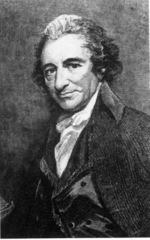Thomas Paine: Difference between revisions
imported>Todd Coles m (→Early Life) |
imported>Todd Coles |
||
| Line 14: | Line 14: | ||
== External Links == | == External Links == | ||
[http://www.ushistory.org/paine/ Links to complete text of ''Common Sense'', ''The Crisis'', ''The Rights of Man'', and ''Age of Reason'' at www.ushistory.org] | [http://www.ushistory.org/paine/ Links to complete text of ''Common Sense'', ''The Crisis'', ''The Rights of Man'', and ''Age of Reason'' at www.ushistory.org] | ||
[http://www.thomaspaine.org/ Thomas Paine National Historical Association] | |||
[[category:CZ Live|Paine, Thomas]] | [[category:CZ Live|Paine, Thomas]] | ||
[[category:History Workgroup|Paine, Thomas]] | [[category:History Workgroup|Paine, Thomas]] | ||
[[category:Politics Workgroup|Paine, Thomas]] | [[category:Politics Workgroup|Paine, Thomas]] | ||
Revision as of 19:43, 23 July 2007
Thomas Paine (January 29, 1737 - June 8, 1809) was a Enlightenment writer, revolutionary, and intellectual from England. He is most famous for publishing his pamphlet Common Sense during the American Revolution, a denunciation of British rule.
Early Life
Thomas Paine (born Thomas Pain) was the son of an unlikely couple - Joseph Pain, a 29 year old staymaker and Quaker and Frances Cocke, a 40 year old daughter of a prominent lawyer and an Anglican. Between the ages of 6 and 13, he was enrolled in the Thetford Grammar School in which he developed an interest in science and poetry. When he turned 13, his parents decided to forgo his formal education and he became apprenticed to his father to learn the trade of corset-making. In 1756, he set out for London as a journeyman staymaker. This endeavor did not last long, however, and in 1757 he decided to join the crew of the British privateer King of Prussia for a lucrative eight month stint.
Upon his return to London, Paine used his earnings to mingle with the artisan-intellectual community of the city. In doing so, he was further exposed to class resentment toward the aristocracy as well as the radical views of people such as John Locke. In 1758, he decided to resume his career as a staymaker and moved to Sandwich, Kent. A year later he met and married Mary Lambert, a local maid, who died shortly after during childbirth. His business collapsed shortly afterward. In 1762, Paine began a new career as an excise officer. He was dismissed in 1765 on the charges that he stamped goods which he did not actually examined. He appealed to the Excise Commission for reinstatement, which was successful in 1768. He was relocated to Lewes, Sussex, where he spent the next six years.
References
Kaye, Harvey J. Thomas Paine and the Promise of America (New York: Hill and Wang, 2005). Kramnick, Isaac, "Editor's Introduction", in Common Sense (London: Penguin Classics, 1986).
